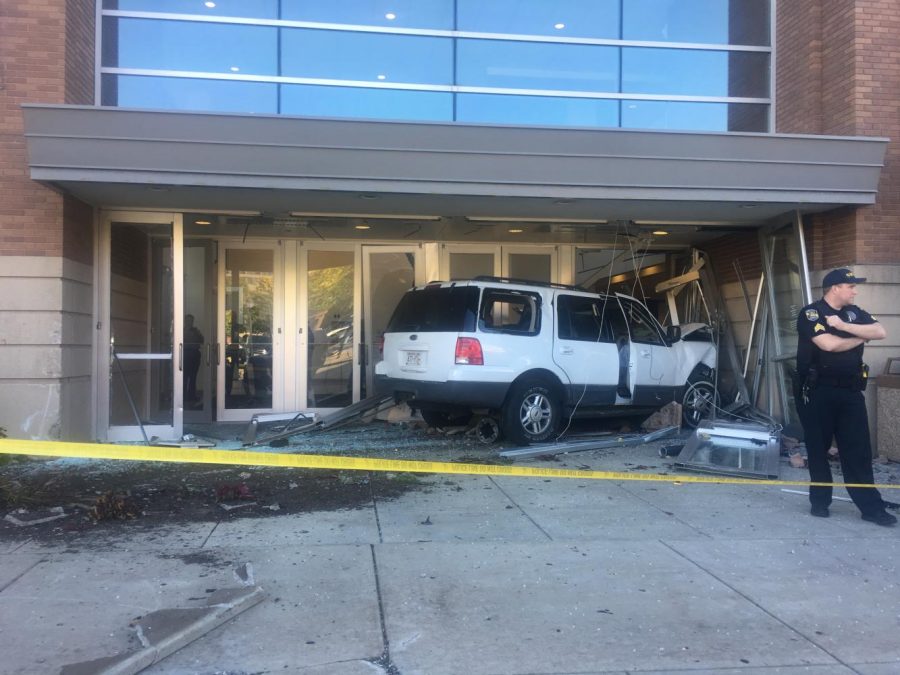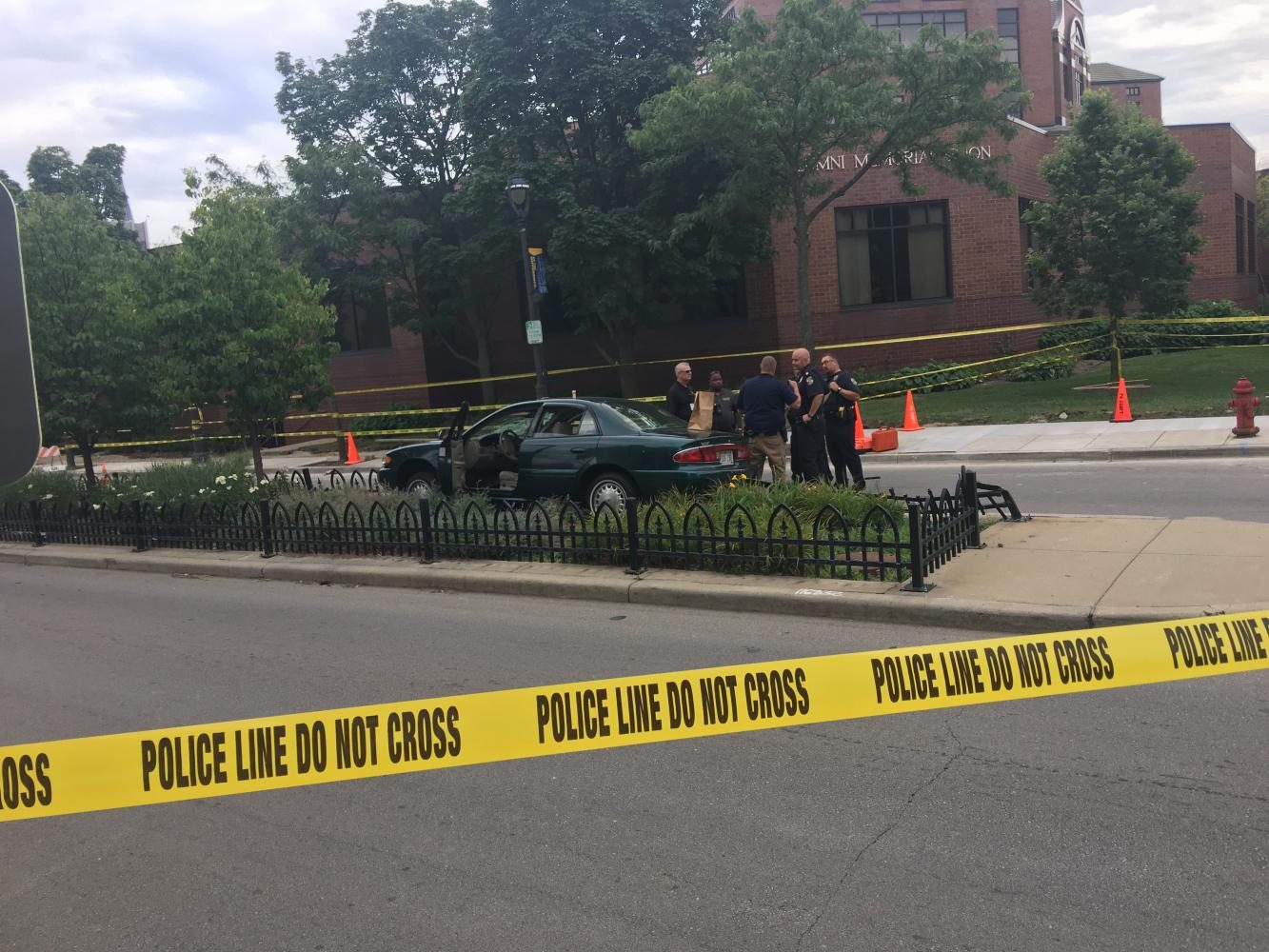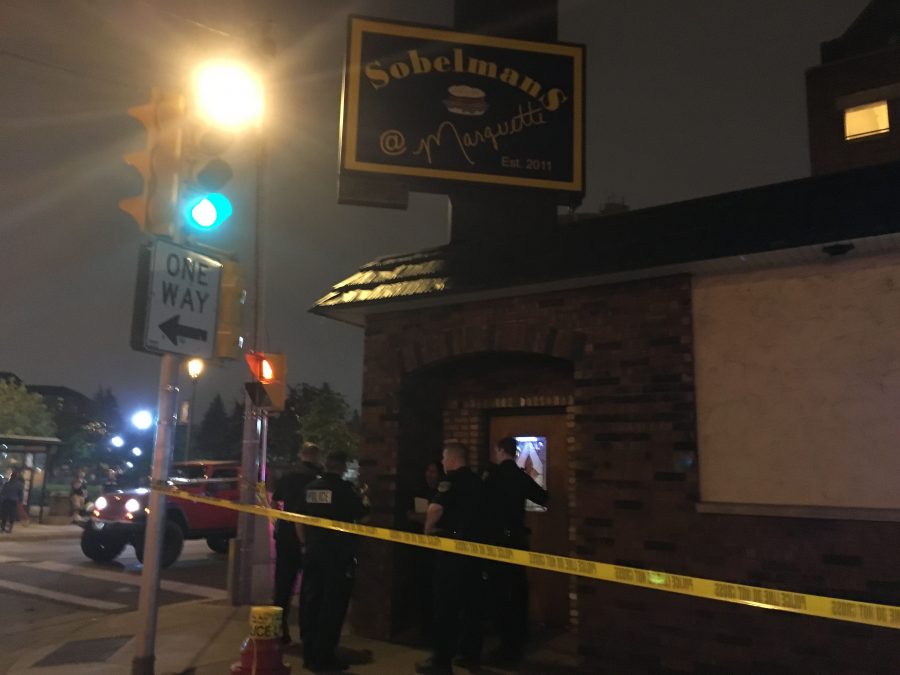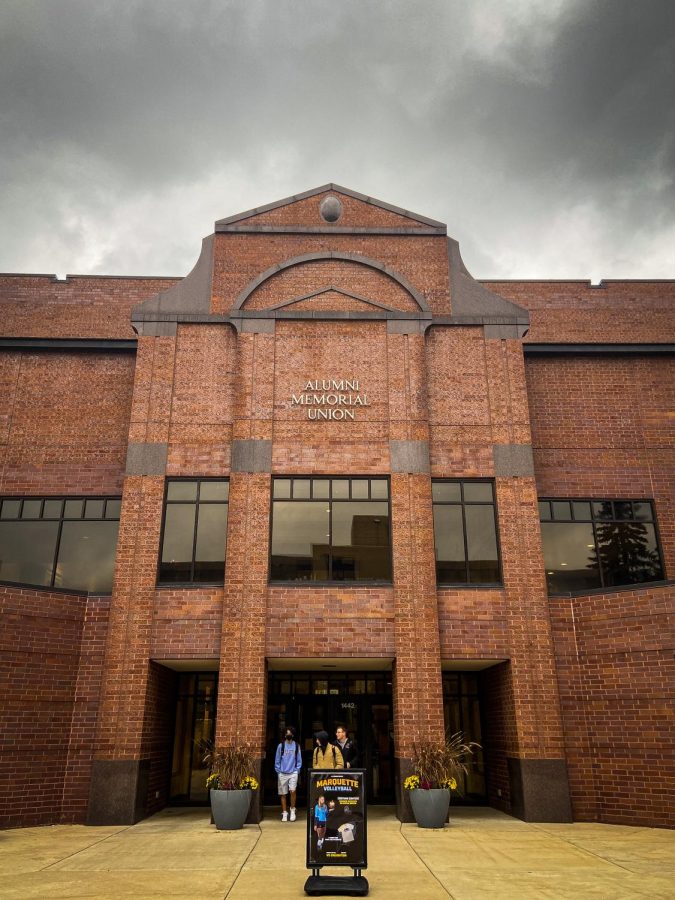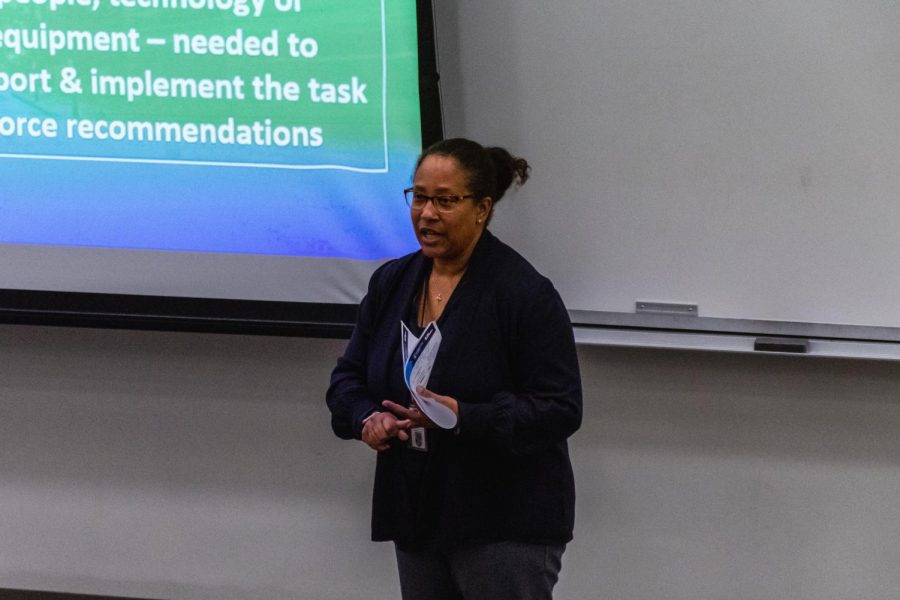In less than one month, student Anne Nyberg has had her own car and a subsequent rental car get hit by Marquette University LIMO vans.
“I’m very frustrated with the whole situation and I want to make sure that something is being done about this,” Nyberg, a junior in the College of Arts & Sciences, said. “I’ve had to deal with this for the last month and it’s kind of dictated my life.”
Her parked Volkswagen Golf was first hit Jan. 22 on Wisconsin Avenue outside of Mashuda Hall. Nyberg went out to her parked car around 9:30 p.m. to move it to 19th Street before the snow plows came that night. Vehicles cannot be parked overnight on mass transit bus routes from Dec. 1 to March 1, according to the City of Milwaukee website.
She found a note on her car that said her car was struck by a campus LIMO. It instructed her to contact Marquette University Police Department if she wanted to file a police report.
Nyberg said her driver’s side mirror was broken and the front driver’s side tire was knocked off the rim.
“It was some real damage,” Nyberg said.
Nyberg described her vehicle as a “pretty small car” that is “hard to hit.”
Nyberg said she contacted MUPD and talked to Officer Lamar Kirk over the phone. Nyberg said Kirk was really helpful. She moved her car to 19th Street and called Marquette’s vehicle insurance, Travelers Insurance Company, the next day, but she said she did not hear back immediately.
After three days of waiting, Nyberg said she called the insurance company again because her car had a flat tire and was not drivable.
Nyberg said she needed her car to get to her off-campus job as a legal assistant at a law firm in Wauwatosa.
She said she was able to talk to someone from the insurance company after finding out the person originally assigned to her case was out of town. Eight days after Nyberg’s car was originally hit, an appraiser came to see the damage and give her an estimate of how much it was going to cost to repair.
She said the insurance company was going to accept liability for the mirror, but the appraiser was unsure her flat tire was due to the collision. Nyberg said she was certain the flat tire was from the collision because she had only moved her car half a block since the collision happened.
Nyber said she paid out of pocket for a tow to get her car to the shop, but she was eventually reimbursed by the insurance company. Nyberg said she was reimbursed by the insurance company for the mirror repair costs as well.
“When they got (it) to the shop, (the shop) said they couldn’t 100 percent say (the flat tire) was from the collision, but can reasonably say that it is,” Nyberg said.
She said she called Travelers Insurance seven times over the course of that week to figure out the situation.
She said the insurance company would not accept liability for the tire, but connected her with Enterprise for a rental car. Though Nyberg had to put down the original deposit on the rental car, the insurance company reimbursed her for the cost.
The tow, damages and rental car cost between $600 to $700, Nyberg said. Nyberg said she went to speak with Matthew Paulus, director of Marquette Risk Management, who helped her communicate with Travelers Insurance to cover the costs. Risk Management is responsible for assessing liability, handling claims and managing the university’s corporate and student insurance plans.
She said Paulus arranged for Travelers Insurance to cover the rental car and the tow costs after Nyberg contacted him.
Paulus said all crashes involving the university’s vehicles get reported to Marquette’s insurance carrier.
For an at-fault crash caused by a campus driver to a student, Paulus said a claims adjuster from the insurance company would provide direction and payment to repair the student’s vehicle and cover other related costs, such as a temporary rental vehicle and towing.
Nyberg said she was in the rental car, which was a pickup truck, for two weeks. The night before she had to return the car was Valentine’s Day. She said she went out to a nice dinner, had a great time and came home to another note on the pickup truck. The pickup truck was parked on Wisconsin Avenue in front of Mashuda Hall, just like her Volkswagen Golf had been a few weeks earlier.
“I looked at the note and it was the exact same thing,” Nyberg said. “The car was struck by a LIMO and I was like, ‘Great. Awesome.’”
Nyberg said she called MUPD and two officers came over. Nyberg said MUPD asked if she had any details about the collision. Nyberg told them she did not have information since her car was parked and she was away from it.
She said the driver’s side door of the rental pickup truck was scratched up, there was a dent, the paint from the truck was scratched off and there was blue paint from the LIMO on the truck.
A claim is initiated and damages will be paid for repair to both vehicles, Paulus said.
Nyberg said she paid $85 for the rental vehicle to be towed to a repair shop, but she said she was reimbursed by the university’s insurance company.
The next day, Nyberg went to return the car to Enterprise and explained what happened to it.
Originally, Nyberg said Enterprise wanted her to pay out of pocket for a $500 deductible for the damage to the rental car. Nyberg said that if that happened, she would dispute the charges with her bank because the crash had nothing to do with her own actions. Nyberg said she told Enterprise that Travelers Insurance should accept liability for the crash with the rental car.
Based on the circumstances, she said Enterprise said it was not going to charge her for the damage.
Nyberg’s rental pickup truck was supposed to have been returned by Feb. 12, but Nyberg said she didn’t return the pickup truck until Feb. 15. She said the delay in returning the vehicle was because she would not be getting her own car back until Feb. 22.
She did not tell Enterprise when she was going to return the car, she said, but she said she communicated with the insurance company. She said the insurance company told her it informed Enterprise the pickup truck would be back Feb. 15.
Nyberg said she was later informed by Enterprise that Marquette’s insurance was not going to pay for the last three days she had the rental car, so Enterprise wanted her to pay out of pocket for it.
The insurance company ended up covering the extra three days of rental costs, Nyberg said.
Without a form of transportation after turning in the rental pickup truck, Nyberg said she was using Uber to get almost everywhere, including for the 15-minute one-way commute to and from her job in Wauwatosa every day. She also got rides from friends, she said.
Nyberg said she had to miss a day of work to sort out matters with her car.
Nyberg is also in the Marine Corps Reserves. Nyberg said she has to go to a Sheridan, Illinois, base once a month for meetings with her unit.
“I’ve spent close to $100 in Ubers getting to and from work, Enterprise and the auto shop,” Nyberg said.
Even though she got her car back Feb. 22, she said she is still frustrated with the Department of Campus Safety.
Nyberg said she talked to MUPD Lt. Mark Cleveland, who helps oversee the LIMO program.
Cleveland said the LIMO program has the most extensive job training out of any student organization at the university, including other student organizations that have student drivers, such as Campus Ministry and the Athletics Department.
“If you compare our training program to anyone else’s on campus, and for that matter, any other campus’ training program for their student drivers, I think you’ll find that we are far and away above everyone’s training for our LIMO drivers,” Cleveland said. “Obviously with the number of transports we do – about somewhere between 230,000 and 250,000 transports in a calendar year – I think there’s a good reason for having that extensive training program.”
He said the LIMO driver application and training process begins with an application, interview and background check.
Cleveland said the background check is to ensure the applicant has a favorable driving record. He said the license check is done through a company called Alert Driving, which checks the record of each applicant and then sends a report back to the Department of Campus Safety.
Cleveland said each applicant is ranked on a scale up to three, with level three being unable to drive, which would result from a past DUI, conviction or speeding ticket of more than 25 miles per hour over the speed limit. Level two is moderate risk, which would result from a past speeding ticket for 10 miles per hour over the limit. Level one indicates no risk.
He said that if an applicant had one speeding ticket from driving more than 10 miles per hour over the speed limit, the applicant would still be hirable.
After the record check, the applicant can be made an offer of employment, Cleveland said.
Employees begin orientation with the student senior supervisors, and then the new employee has a test drive with another supervisor to see how the new employee handles driving a large vehicle.
After the new employee successfully passes the test drive, the person take a 25-question quiz about topics LIMO drivers need to know about, including codes and addresses. If the person passes that successfully, the person moves on to field training and is matched with a supervisor who rides along with the person and evaluates his or her ability to remember addresses.
The supervisor tests other variables, like the new employee’s effectiveness with using directions, staying in lanes and making correct turns, Cleveland said.
He said the new employee is with that supervisor for at least four shifts, and if there are some concerns with the new employee’s driving, that person is asked to do a fifth shift with a supervisor.
Finally, before moving on to a probationary assignment and becoming a LIMO driver at the most basic position, Cleveland said applicants must pass a more than 100-question test related to being a LIMO driver, like phone numbers and procedures on emergencies.
He said this process typically takes about a month and a half to two months to be completed.
LIMO drivers can go through additional training to be promoted and be able to train other LIMO drivers, Cleveland said.
“(Cleveland) told me that LIMO drivers have the most extensive training, but if the training is not effective, then it’s worthless,” Nyberg said.
MUPD Capt. Kranz said when MUPD arrives at the scene of a crash involving a LIMO, officers treat it no differently from any other type of crash incident they respond to.
“We don’t see the LIMO drivers being any different from a Jimmy John’s driver or somebody just driving down the street,” Kranz said. “The officers can’t show bias and say, ‘Hey you’re one of us, you’re good to go.’”
Kranz said when officers are responding to the scene, they do an investigation of how the crash occurred. He said officers check if there was extreme negligence or a violation of law. If so, the responding officer issues a citation at his or her discretion to whichever party is responsible, Kranz said.
Cleveland said disciplinary measures for a LIMO driver involved in a crash depends on whether it was an at-fault crash or a not-at-fault crash for the driver.
“If they aren’t at fault, then there is no issue there,” Cleveland said.
Kranz said running a stop sign or a red light is different from taking a corner too tight and brushing up against a car and hitting the mirror.
“Running a stop sign is a violation,” Kranz said. “It’s negligence on the part of the operator, but with the snow and the tight street and the challenges that the LIMOs have right now, they’re not necessarily going to get a ticket if they brush up against the car and it’s just an accident.”
Cleveland said he could not comment on specific disciplinary procedures for LIMO employees because he said they are confidential. He did not disclose whether any LIMO employees would face disciplinary measures for the crashes involving Nyberg’s car and rental pickup truck.
“If they are at fault, we track that and if they get to a point where it is getting excessive, then they have to come meet with me and we discuss if they need additional training or if they feel comfortable enough to continue driving or what they want to do,” Cleveland said.
Nyberg said Cleveland told her he could not disclose any information about the driver. However, the name of the driver who originally hit her car was on the ticket left by MUPD. Nyberg told Cleveland she understood the confidentiality, but she wants to know that there will be changes made, including improved LIMO driver training, so this doesn’t happen to other people.
Cleveland did not comment on how often LIMO-involved crashes occur.
“I don’t think it happens all that often, but if it happens twice in two weeks, that’s a pattern,” Nyberg said. “One time it sucks and is bad luck for me, but twice in two weeks is like the worst luck in the world. And that’s what Lt. Cleveland said to me.”
Nyberg said Cleveland told her he was sorry about her bad luck.
Cleveland said he cannot comment on a private conversation that took place between Nyberg and himself.
“The issue isn’t my luck. The issue is your drivers. They’re not doing what they need to be doing,” Nyberg said. “So needless to say, I don’t park on the street anymore.”
Nyberg said the responding officers at the scene were helpful, but she said other members of MUPD, specifically Cleveland, have not helped her.
“No one has been able to help me find a solution to this issue … I don’t expect a change,” Nyberg said. “They didn’t seem that concerned about it.”


